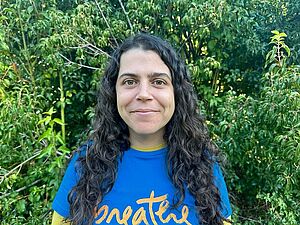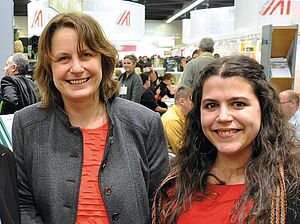"When we unite our efforts, no challenges can stop us"
50th anniversary voices
Julia Lernoud has been connected to the organic movement in Argentina since her childhood. She worked at FiBL Switzerland in 2010 and from 2014 to 2020. In 2017, she was elected to the World Board of IFOAM – Organics International, since 2021 she has been one of its Vice Presidents.
What connects you with FiBL?
I got to know FiBL and Urs Niggli, the former director of FiBL Switzerland, while doing an internship at IFOAM – Organics International – my next stop was FiBL! I felt extremely fortunate to get the opportunity to do an internship at FiBL Switzerland, where I worked with Helga Willer in the communication team. There my adventure of getting to know the organic world better started. I worked together with Helga Willer for many years, producing the yearbook "The World of Organic Agriculture", which celebrated its 25th years anniversary this year. The experience of connecting with organic organisations and stakeholders from every corner of the world taught me the challenges and opportunities the sector faces in different regions and countries.
Is there a key event or a funny story from your time at FiBL?
Over the years there were many funny and inspiring stories. Once, I and Beate Huber, head of the Department of International Cooperation and today also Vice-chairwoman of the Management Board of FiBL Switzerland, had to be in Brussels for an important event at noon. For the first time, FiBL had the opportunity to present its research findings to the EU Commission's Directorate-General for International Partnerships. At 7 am, we met in Basel at the train station, having just been informed that our flight was cancelled. We checked the trains, other flights, nothing would work. So, we decided to rent a car. The GPS said we would arrive just in time if we were to leave at that moment. However, all car rentals would only open at 8 am. Suddenly, we saw a lady in one of the offices. Lucky us! She saw our desperation and rented us a car. I did not have a driver license, so Beate Huber had to drive; however, she still had to finish her presentation. During the high-speed road trip, she was telling me what she needed for her presentation and I tried to prepare it. Fortunately, we got there with five minutes to spare. It was a wonderful and very interesting meeting and the experience showed me that when we unite our efforts, there are no planes, no opening hours, no challenges that can stop us!
From your point of view, what has FiBL achieved for the food and agricultural sector in general and the organic sector in particular?
FiBL continues to bring clarity and transparency to the organic movement as well as to conventional agriculture. Since its beginnings, FiBL has been the place that provided latest research and innovation in organic agriculture. It has always supported young scientists and innovative research, which has opened the door to organic for many young minds. Its close relation with farmers and different stakeholders makes FiBL a unique research institute, connected with the daily challenges and realities of the sector. Thanks to FiBL, organic farming has the facts to show its potential, and it helped build the global recognition organic agriculture nowadays has.
If you look to the future, what would you like FiBL to achieve?
I believe the next 50 years will be extremely challenging: climate change, food insecurity, social and economic crises, that is why we need hard facts to show that organic has the tools to be a key part of the change the world desperately needs. FiBL, together with the global organic movement, has a unique opportunity to bring change. The time is now, and FiBL plays a crucial role! For many, many years of good and holistic organic research!





